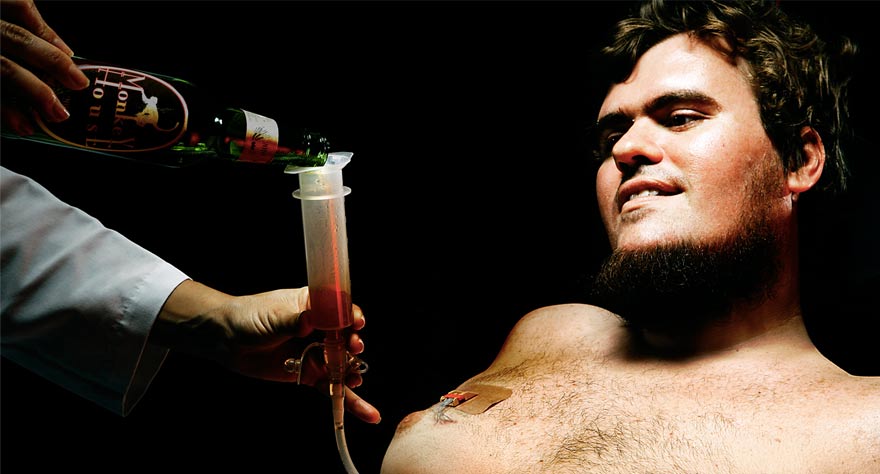
At all times true to his artistic nature, Patrick O'Brien's doc is the most genuine look into life with ALS put on-screen.

At all times true to his artistic nature, Patrick O'Brien's doc is the most genuine look into life with ALS put on-screen.
For most, last summer’s Ice Bucket Challenge was the first they’d much stopped to consider the disease ALS (amyotrophic lateral sclerosis). Since then two Hollywood films have come out highlighting the disease, The Theory of Everything and the Hilary Swank led You’re Not You. The first focusing more on the spouse taking care of a husband (slash genius) with ALS, the second a poorly received drama where the disease is sideswiped by character development. Instagram-ed videos of ice water baths aside, true insight into the day-to-day of living with ALS isn’t a subject featured all that often in film. A documentary about ALS is the perfect vehicle for that insight, and one made by a madly artistic force of nature—Patrick O’Brien aka TransFatty, who thought to tape his every step in his personal journey with the disease—ends up being a brilliantly honest, creative, and moving spotlight—not on the disease, but on people with the disease.
Directed, written by, and all about Patrick, the film is of course deeply personal, even more so in that Patrick, who no longer has use of his limbs or the ability to speak, uses this completely unconventional documentary to express himself in a way that allows us into his head, the only place where he’s truly active anymore. And it’s a wacky, scary, hilarious, and moving place. Those familiar with TransFatty’s work previous to the documentary, as an Internet sensation and DJ, may be used to his mid-90’s MTV-style. Erratic coloring, home video footage of strange set-ups. Patrick wearing three prosthetic breasts. Buildings being blown up. All edited together with footage Patrick has been shooting since before he was even diagnosed. As a filmmaker it makes sense he’d be drawn to capturing life on camera, but the extent to which he has been thoughtful to record the events in his life is staggering. Not to mention that he convinced his friends and family to take up the camera when he wasn’t able to hold it himself any longer.
The documentary starts around when Patrick started to notice his first symptoms. A quick look at the work he did after film school. The short films he made and his electronic music as DJ TransFatty. Then a video of himself, walking through his apartment, falling in his hallway and knowing a few records off his shelf on the way. Then a scared admission on camera that he finds out the next day whether or not he has what many consider to be the most debilitating disease humans have yet to be subjected to. At the doctor’s office, still recording of course, he tells the doctor his legs have been shaking. He’s been falling down. Not soon after, he films the official diagnosis: he has ALS. His family sits around him in shock as Patrick plasters a scared smile on his face. He’s a man quick to smile in any situation, a part of himself that has not yet seem to have gone away.
Every stage of Patrick’s disease is caught on film. He and his family go to Puerto Rico where they have to help him walk. They work out his limbs for him on the bed as he makes crude jokes. He floats in the pool, still joking about his situation, about the unknown future. His speech has gotten a little bit slower. Patrick holds nothing back. He shows every high and low of his experience with ALS. The fun times, like when he camped out in front of the White House naked with a statistic written on his stomach to make a point about how many people are taken by ALS every hour. The times where his friends roll him about, American flag flowing off the back of his wheelchair. For a wheelchair-bound man with almost no use of much of his body, he clearly stayed incredibly busy. Busy enough, even, to fall in love and have a son.
Throughout the film O’Brien “speaks” directly to his son, the robot that has replaced his voice expressing in a supine but ironically comical voice, some of the many thoughts he has. His gift as a writer is clear. His sense of humor ever-present. And his pain on not being the father he wants to be utterly heart-wrenching. Patrick O’Brien is never manipulative. Never appears to be looking for sympathy. He’s doing what many artists claim as their driving force: fulfilling an innate need to express oneself. Capturing his life, capturing his essence, is the motivation of the film. And with such a colorful essence, his life translates to film in the most perfect way.
It’s so hard not to constantly question the fairness of life when a person of such acute mental sharpness and artistic genius would be shackled by a disease that threatens to take away most of their humanity. I wouldn’t dare comment on O’Brien’s ability to make the most of his situation. He’s made better use of his body and brain than most full-functioning humans, and it’s not because he’s been attacked by ALS, it’s because he’s an artist and a film director and he has thoughts worth sharing. Watching him change because of ALS is difficult, but the parts that will tear your heart out are the hardships O’Brien faces as a normal human man. Hardships of love, of fatherhood, of artistic struggle, and basic human needs. And that’s where he’s done what other films around ALS have not, reminded us that no one should ever be defined by the things they can’t control, but by what they choose to express and put into the world, circumstances be damned.